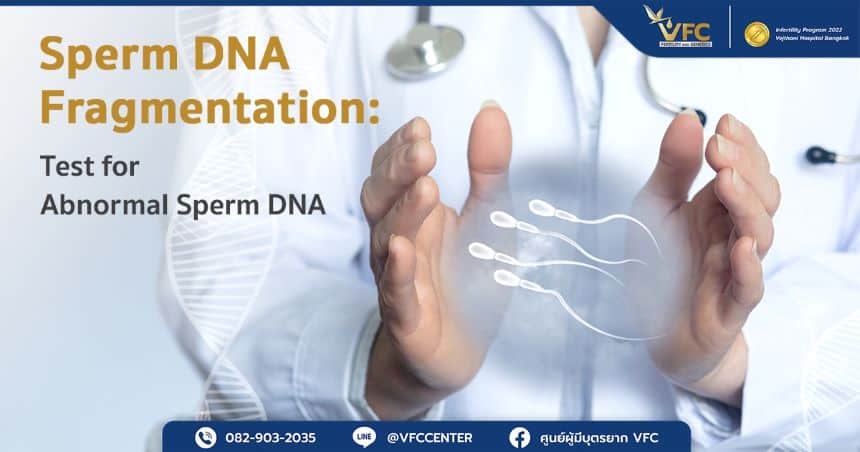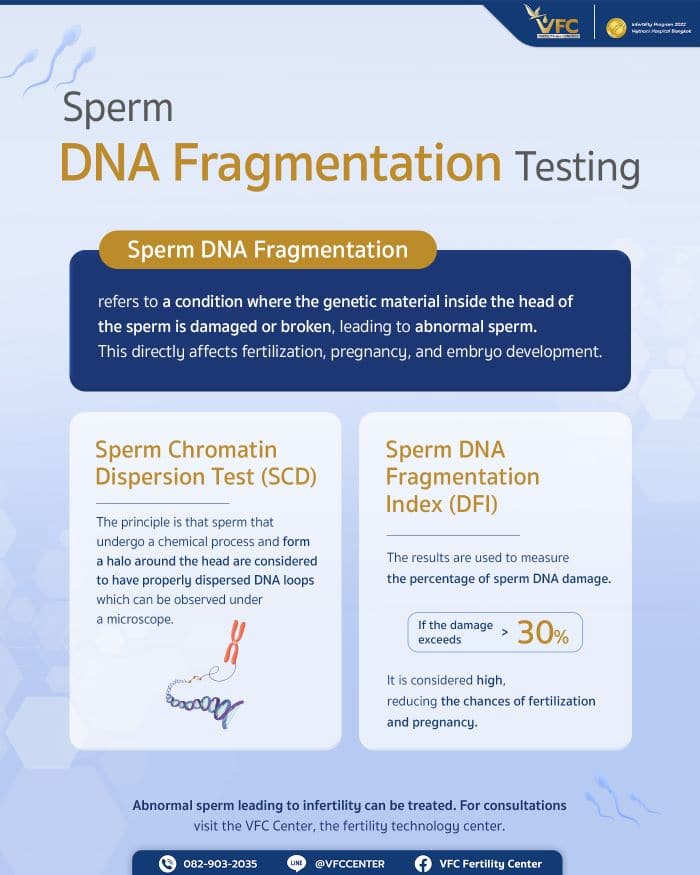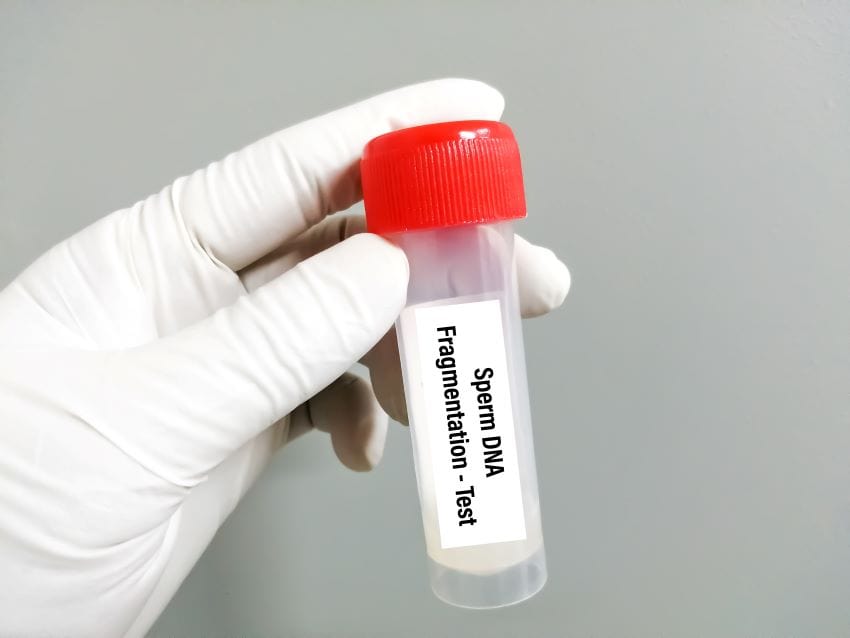
A healthy pregnancy and the birth of a healthy baby require physical readiness from both partners. Although men do not carry the pregnancy, they must also prepare before planning to have children to reduce the risks associated with abnormal sperm, which may lead to complications during pregnancy for both mother and baby. Sperm DNA Fragmentation is a major cause of male infertility.
How Does Abnormal Sperm Affect Pregnancy and Conception?
Abnormal sperm is a leading cause of infertility and problems in conception. Therefore, couples should understand how these abnormalities impact pregnancy as a crucial first step in preparing for parenthood effectively.
1. Decreased Chance of Successful Fertilization
Sperm abnormalities, including shape, count, and motility, all contribute to male infertility. This is because defective sperm can’t effectively swim through the cervix and fallopian tubes to fertilize an oocyte, thereby the chances of natural conception and pregnancy.
2. Increased Risk of Miscarriage
Abnormal or damaged sperm DNA, even if fertilization is successful and the embryo develops, there is a higher risk of genetic abnormalities or developmental issues, which can lead to frequent miscarriages.
3. Poor-Quality Embryos and Impact on Development
As previously stated, sperm with DNA damage may result in poor-quality embryos that develop slowly or abnormally, making it difficult for the embryo to implant into the endometrium. This can also increase the risk of physical and cognitive abnormalities in the baby.
4. Increased Risk of Genetic Disease Transmission to the Baby
If sperm has genetic abnormalities, such as chromosomal issues or mutations, the risk of passing genetic diseases to the child increases. When fertilization is achieved through assisted reproductive technology, such as ICSI or IVF, proper screening of the embryo’s chromosomes is necessary.

DNA Fragmentation: Detecting Abnormal Sperm at the Genetic Level
DNA fragmentation refers to the breaking of sperm DNA. This condition causes damage to the genetic material inside the sperm’s head. Although the sperm may appear normal externally, its DNA might be damaged, requiring laboratory testing for diagnosis. DNA fragmentation directly affects fertilization success, pregnancy, and embryo development. Several factors can cause DNA fragmentation, including:
- Oxidative Stress: Caused by excessive free radicals, resulting from smoking, exposure to toxins, or chronic inflammation.
- Aging: Increasing age leads to a higher likelihood of sperm DNA damage.
- Varicocele (Enlarged Veins in the Scrotum): Elevated temperatures in the scrotum lead to reduced sperm quality.
- Other Factors: Stress, smoking, alcohol consumption, prolonged exposure to pollution, certain infections, and heat exposure (e.g., using laptops on the lap or riding motorcycles) also contribute to DNA fragmentation.
Methods to Test Sperm DNA Fragmentation Men Should Know
Sperm DNA fragmentation testing measures the extent of DNA damage in sperm. This test provides a more detailed diagnosis of male infertility compared to a basic semen analysis.
One method of testing is the Sperm Chromatin Dispersion (SCD) Test, which assesses sperm DNA quality. It is particularly useful in cases where basic semen analysis appears normal, but the couple is still struggling with infertility or recurrent miscarriages.
The SCD Test operates by treating sperm with a specific chemical solution that removes proteins from the sperm head, allowing the DNA to decondense. Sperm with intact DNA forms a “halo” around the head, showing a proper dispersion of DNA loops.
Sperm with fragmented or incomplete DNA cannot form the halo, which can be observed under a microscope.
The results are then calculated into an index called the Sperm DNA Fragmentation Index (DFI), which indicates the percentage of sperm with damaged DNA. A DFI of over 30% indicates high damage, significantly reducing fertilization chances, embryo quality, and the likelihood of pregnancy.
Steps for DNA Fragmentation Testing
The process for DNA fragmentation testing includes:
- Collecting a Semen Sample: The male partner provides a semen sample.
- Laboratory Analysis: The sample is sent to a lab for analysis.
- Sperm DNA Fragmentation Testing: The test is conducted using the SCD method.
- Result Analysis and Treatment Plan: The doctor analyzes the results and creates a treatment plan for infertility.
Selecting Healthy Sperm for ICSI with MACs Sperm
If the male partner has abnormal sperm, don’t lose hope in conceiving. Various infertility treatments exist, including techniques to select healthy sperm for fertilization. One such method is MACs Sperm, which uses magnetic fields to separate healthy sperm from those with abnormalities or those undergoing apoptosis (cell death). This process leaves only viable sperm, ready for the next step in fertilization.

Preparing for Male Infertility: Abnormal Sperm Can Still Lead to Parenthood
For men experiencing infertility, in addition to medical treatments, lifestyle adjustments and following appropriate guidelines can help improve sperm quality and prepare for effective fertilization.
1. Adjusting Lifestyle Habits
Daily habits significantly impact sperm quality. If you’re planning to conceive, make sure to get at least 7-8 hours of sleep, exercise regularly, manage stress, and avoid smoking, alcohol, and recreational drugs.
2. Eating Foods Rich in Antioxidants
Antioxidants play a crucial role in protecting sperm from DNA damage. Consuming antioxidant-rich foods such as oysters, red meat, eggs, nuts, salmon, and leafy green vegetables helps reduce the risk of DNA fragmentation.
3. Timing Intercourse Properly
Excessive sexual activity may reduce sperm count, while abstaining for too long can lead to degraded sperm quality. It is recommended to abstain from sex for 3-5 days before the woman’s ovulation period for optimal sperm quality. For IVF or ICSI, semen should be collected 2-5 days after ejaculation.
Proper preparation from both the male and female partners increases the likelihood of successful IVF or ICSI treatments, reducing the risk of miscarriage and ensuring a healthy pregnancy. If you’re planning to conceive soon, start with a sperm health assessment and follow the advice of an experienced fertility specialist. At VFC Center (V Fertility Center), we offer consultations, infertility screenings, sperm health checks, and infertility treatments to maximize the chances of a successful pregnancy.
A smooth pregnancy and the birth of a healthy baby require physical readiness from both the male and female sides. Although men do not carry the pregnancy, they must also prepare before planning to have children to reduce the risks associated with Sperm DNA Fragmentation, which may lead to complications during pregnancy for both mother and baby. This issue is a major cause of male infertility. To ensure the best chance of conception, an infertility check in Bangkok can help assess sperm health and identify potential issues.
For inquiries or to schedule an appointment, contact us at:
VFC Center – V-Fertility Center
Hotline: 082-903-2035
LINE Official: @vfccenter

The team of specialists in obstetrics and gynecology and reproductive medicine





No Comments
Sorry, the comment form is closed at this time.